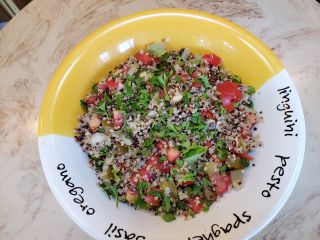

Key points
- Research shows several health benefits of consuming quinoa.
- Quinoa is a source of complete plant protein.
- Quinoa is very easy to cook and goes well with most dishes.
Many health professionals, myself included, believe that food is our medicine, which is why we must consider nutrition in any discussion of our health. Proper nutrition is essential for our body, brain, and well-being—and what’s good for our body is also good for our brain. There are many varieties of food that can benefit both and in my blog I have written about some of them. Today’s topic is quinoa because it is a powerful antioxidant, packed with essential nutrients, easy to prepare, goes well with most savory or sweet dishes, and it is delicious.
What is quinoa?
Quinoa (pronounced KEEN-wah) is a flowering annual plant in the amaranth family (related to spinach and chard). It was cultivated in South America for thousands of years and was considered a sacred food for Incas. Once it became popular in Western countries, it was also grown in Europe and in the USA Colorado Rocky Mountains. There are three main types of quinoa—white, red, and black—but it can be sold as a blend of the three kinds in health food stores. Quinoa is classified as a whole grain, but it looks like a tiny seed.
Health benefits of quinoa
Quinoa contains antioxidant and anti-inflammatory plant compounds and may help protect against some diseases. It is also high in minerals and vitamins. It contains zinc, copper, iron, magnesium, potassium, manganese, sodium, and phosphorus. As for vitamins, it contains B1 (thiamin), B2 (riboflavin), B6, B9 (folate), and vitamin E.
Quinoa is high in protein. It is a source of complete plant protein because it contains all essential amino acids; therefore, it is a good protein source for vegetarians and vegans. It also has fewer carbohydrates than other grains so it is a healthy carbohydrate choice. It is gluten-free; therefore, it is good to eat for people with gluten intolerance. It is also richer in fiber than most grains, which makes you feel full for a long time, may help you lose weight, and may lower the risk of intestinal cancer. It can also help you stay regular. Some research suggests that it may also help regulate blood sugar.
Brain benefits of quinoa

Image by Barbara Koltuska-Haskin
Recent research studies indicated that biomolecules (polysaccharides) from quinoa may have an anti-aging effect. It helped improve learning and memory in aging mice. (Hu, Y, et al. 2022). Quinoa supports brain health. It is rich in iron, which keeps oxygen-carrying red blood cells healthy. It is also a great source of potassium, which helps the conduction of messages through nerves. Quinoa contains vitamin B2 (riboflavin) which is good for brain and muscle cells.
How to cook quinoa
Quinoa is simple and quick to prepare. It needs to be rinsed first in cold water to get rid of the bitter-tasting compound (saponin), which coats the seeds. Use 1 part of quinoa and 2 parts of liquid, which can be water, broth, bone broth, or etc. Bring to boil, cover, reduce heat to simmer, and leave for 20 minutes or more until liquid is absorbed and the quinoa gets kind of sprouted, and then enjoy. Quinoa keeps very well in the fridge for many days, so you can do it once a week and add it to soups, stews, and salads or just have a big tablespoon of it if you are hungry and dinner is still cooking. You can also freeze leftovers for up to 10 months. Bon appetite!
About the Author
 Barbara Koltuska-Haskin, Ph.D., is a neuropsychologist in private practice in Albuquerque, New Mexico with over 30 years of clinical experience, and the author of How My Brain Works: A Guide to Understanding It Better and Keeping It Healthy. Her book has won 2 International Book Awards and 5 National Book Awards.
Barbara Koltuska-Haskin, Ph.D., is a neuropsychologist in private practice in Albuquerque, New Mexico with over 30 years of clinical experience, and the author of How My Brain Works: A Guide to Understanding It Better and Keeping It Healthy. Her book has won 2 International Book Awards and 5 National Book Awards.







Comments
Post a Comment